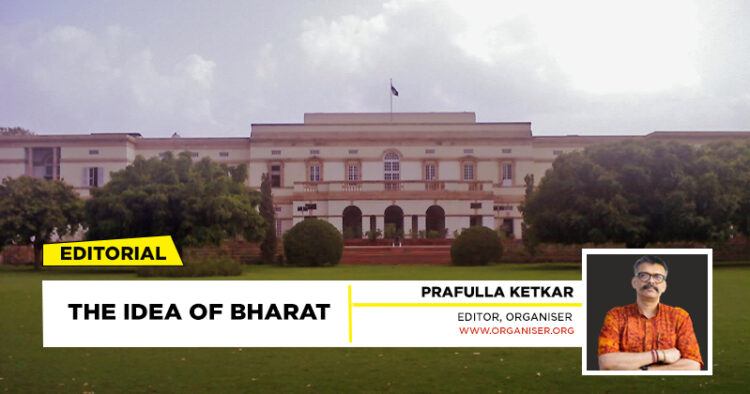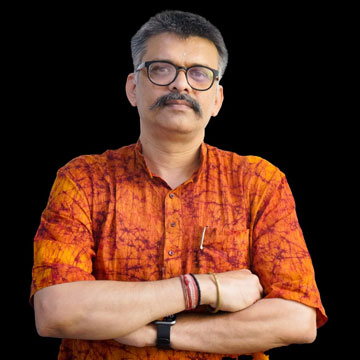In 1833, while addressing the British Parliament as secretary to the East India Company Board of Control, Lord Macaulay had stated –“It may be that the public mind of India may expand under our system till it has outgrown that system; that by good Government we may educate our subjects into a capacity for better Government; that, having become instructed in European knowledge, they may, in some future age, demand European institutions. Whether such a day will ever come, I know not. But never will I attempt to avert or retard it. Whenever it comes, it will be the proudest day in English history”. Despite all contributions of Nehru to the freedom struggle and providing stability to the post-Independence democratic processes, his ‘idea of India’ was essentially a European construct is the fact which is evident from the Nehruvian idea of democracy based on socialism and secularism.
What is then the ‘Idea of Bharat’ that differentiates us as a nation? Firstly, the idea of Bharat always rested in the decentralised form of institutions and Governance. The idea of central planning and imposition of legislation from above was never in tune with the idea of Bharat. We are not lawbreakers, but laws and policies, emanating from above essentially disconnect us from the roots of family, village and the entire ecosystem with geo-cultural context. Bharatiya democracy was always rested with the society and not with the centralised democratic institutions, as Nehru believed.
Secondly, Dharma, not religion in the Semitic sense but more in the spiritual sense, was the guiding and practising force of this decentralised society. This autonomy of society made our civilisation resilient of external aggressions. The Melas, Yatras, temples and festivals were not just religious affairs; they were the instruments of bonds for this nation, as Gurudev Rabindranath Thakur understood in his Swadesi Samaj. Managing education, ensuring food, health-care, water resources for all etc. were not the State but societal responsibilities. The Participatory and collective approach was inherent in it. The British, being the alien civilisation either demonised or crushed this approach. The ‘Nehruvian’ ideals in the name of ‘secularism and socialism’ continued that process, with more sophisticated, institutionalised and democratic fashion.
Thirdly, the assimilation and accommodation process of people coming from outside had a very peculiar process in Bharat, since time immemorial. ‘We, the people’, never considered any group or society as our enemy, either by ideology or religion. It was always beyond ‘tolerance’ and more of acceptance which many Nehruvians would never agree. While practising that acceptance, Bharat never compromised with the basic spirit of respecting all ways. Relinquishing the soul in the name of accommodation was never the Idea of Bharat. That is why this nation has produced a tradition of selfless sages in the ancient period, and Buddha, Kautilya, Shankaracharya, Sant tradition of Bhakti Parampara, warriors like Shivaji and Guru Gobind Singh etc. followed them at various times to save this soul of the nationhood.
Nehru’s commitment to his ideals of democracy, secularism and socialism was undeniable; regrettably, those ideals were non-Bharatiya is the problem. It led to denying the soul of Bharat that is decentralisation, Dharma and securing the tradition of acceptance and assimilation.
Thanks to the influence of Gandhiji and many other stalwarts of the Freedom Movement, our Constitution essentially carried forward the age-old spirit of democracy based on societal Dharma. That is the reason original Constitution did not mention the alien concepts like ‘socialism and secularism’. Nehru brought this through his monopoly over the party structure and eventually made these as our national goals through education. The elitist monopolisation of ‘Idea of India’ based on the façade of secularism and socialism led to the appropriation of public property into a private museum. Over the period, both the Nehruvian ideals are rejected by the society. What should be the replacement in the changed context is the real contestation?
After completing 71 years of Independence, we have made strides in different walks of life, but simultaneously, we are still struggling with many of the basic issues. The artificial divides of North-South, Rural-Urban, Majority-Minority etc. are the direct outcome of Anglicised ‘Idea of India’. Many of us, with the prism provided by the Nehruvian education system, have also lost the vision to see Bharat from Bharatiya perspective. With our true tradition of accommodation, how to rekindle the ‘idea of Bharat’, that already exists somewhere deep in our minds or among the groups living in villages and forests, for the opinionated, educated minds. How to restore the sanctity of traditions like that of Kumbh and the real intellectual churning like that of Naimeshyaranya, is the real challenge before us. The Government can at the most facilitate this process, but revitalising the social mindset through formal and informal education is the key. This Independence Day, if we could resolve to experience and realise Bharat with Bharatiya perspective, it will not be the obliteration of the Nehruvian legacy but digesting and assimilating it with the true Independence of Bharat.




















Comments